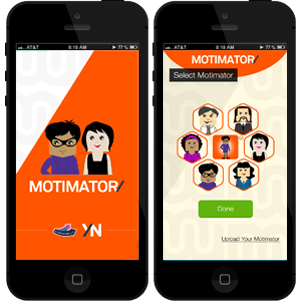Work stress
Hard to drag yourself out of bed to your 9-5? Fantasies of throwing the laptop out of the window? You may be suffering from work-related stress.

"You want that report by WHEN?"
What is work-related stress?
One in five workers in Britain report feeling extremely stressed at work, according to the Health and Safety Executive (HSE), which estimates that 10.5 million working days are lost each year to work-related stress, depression and anxiety.
Stress is the reaction people have to excessive demands or pressures. You may find it difficult to cope with tasks, responsibilities or other types of job related pressures or you might get anxious trying to meet such demands. It isn’t just bad for your work, it could also be affecting your health.
What causes it?
Work stress may be caused or amplified by a number of factors including:
- Bad relations with other work colleagues
- Long and/or irregular hours
- Too little work – or too much
- An increased workload
- Repetitive work/boredom and lack of job satisfaction
- Working alone
- Job insecurity
- Job or organisational change
- Low pay
- Jobs with heavy emotional demands
- Bullying or harassment
- Poor working environments such as excessive noise, the presence of dangerous materials, over-crowding, poor facilities, or extreme temperatures or humidity
- Increased accessibility – the use of mobile phones, pagers and emails means the boss can always chase up work
- External pressures such as financial worries or family problems.
What are the symptoms of work stress?
- Difficulty getting to sleep or difficulty waking up in the morning
- Constant fatigue
- Forgetfulness
- Aches and pains for no apparent reason
- Poor appetite
- Social withdrawal
- Loss of interest in activities
- Increased anxiety and irritability
- “Flying off the handle”
- Increased heart rate
- Migraines/headaches
- Blurred vision
- Dizziness
Everyone has bad days but if you’ve noticed three or more of the above symptoms and you’ve experienced them for some weeks, you may need to do something about your stress levels. If you think you may be suffering from work-related stress it is worth visiting your doctor (GP) for a check-up and to rule out other possible causes of your symptoms.
What are the long-term health implications?
Stressed out people have higher blood pressure, and where stress-levels hit boiling point, sufferers are at a higher risk of death from any cause than their more chilled out colleagues. They are also prone to heart disease, colitis (inflammation of the bowels), thyroid disorders and ulcers. Time to make that GP appointment.
How do I deal with it?
If you are suffering from work-related stress, let your line manager know. Your employer has a legal duty to help reduce the incidence of stress at work. If you’re struggling to cope it’s better to ask for help than to soldier on alone until you reach breaking point. If you can’t talk to your manager – for example if they’re what’s making you stressed – speak to your human resources department or another senior staff member.
Some suggestions for how to calm down:
- Try to make time for yourself away from work to wind down. For example relaxing in a warm bubble bath, listening to soothing music and shutting out the world for a while.
- Take time for your mind and body to relax. Methods can include reading, meditation and yoga.
- Take time to exercise. Regular and frequent exercise is a good stress reducer.
- Find time to pursue non-work activities such as hobbies and recreational activities.
- Eat well – skipping meals will deplete your energy and leave you drained.
- Talk to your family and friends. Make time to see your mates, it will help you unwind after work and let you unburden any problems.
- Learn to say no. If you are asked to take extra work on board, or to stay in the office after your colleagues have left, have the confidence to decline.
- Take breaks at work. Don’t stay glued to the job – take a few minutes to sit back and relax or take a brisk walk during your break.
- Plan your work. Sit down and establish what needs to be done. If you have an excessive workload, delegate if possible, and decide on when your work needs to be completed.
- Write things down. Getting your worries down on paper can make them seem more manageable and help you figure out what might help.
Next Steps
- Chat about this subject on our Discussion Boards.
- Need help but confused where to go locally? Download our StepFinder iPhone app to find local support services quickly.
By
Updated on 29-Sep-2015
No featured article














